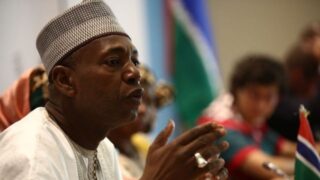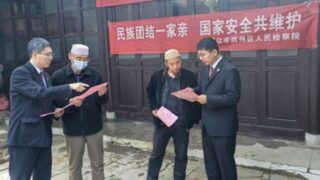Sensational TV series about religious leaders sentenced for sexual abuse are broadcast without considering that they wreak havoc in the lives of their innocent followers.
by Massimo Introvigne


Last month, I interviewed in Australia a young girl I would call Grace (not her real name). A brilliant company executive with an unimpeachable curriculum, she had just been called by her employer and asked just one question, “Are you still a member of Providence Church?” When she answered yes, and added she did not plan to leave the church in any foreseeable future, she was immediately fired.
The employer had known for years that Grace was a member of the Providence Church, and that the church leader had been sentenced for sexual abuse, as the story had been reported in Australian media. However, he decided to fire her after a Netflix TV series on Providence and its leader had gathered millions of viewers.
I collected similar stories in several countries. Members of Providence, of the Mexican megachurch La Luz del Mundo, of the Czech Guru Jára Path, of the Buenos Aires Yoga School in Argentina either lost their job or had serious problems in their workplaces. The same happened to devotees of Shincheonji in South Korea after the accusation (later declared false by the local Supreme Court) that their religious movement had willingly spread the COVID-19 virus.
Members of the Unification Church/Family Federation in Japan went through the same ordeal after the assassination of former Prime Minister Shinzo Abe by a man who claimed that the church, to which Abe was friendly, had ruined his mother, who is still a member. Although the dynamics are similar, I will focus here on cases where the leaders have been accused of sexual abuse, rape, or inducing members to prostitution.
The legal stories are different. President Jung Myung Seok of Providence Church has been arrested in 2007 and later sentenced to ten years in jail for four counts of rape. He remained in jail until 2018, but was accused of sexual abuse again and re-arrested in 2022. He is currently in prison awaiting trial. Apostle Naasón Joaquín García of La Luz del Mundo pleaded guilty in California in 2019 to three charges of sexual abuse of children and is serving a sentence of 16 years and 8 months.
Guru Jára was sentenced in 2018 to five years for rape, and all his further recourses and appeals were rejected. He was at that time in the Philippines, and remains there in a detention center for illegal immigrants pending a long procedure where he is seeking political asylum claiming that the Czech decision was politically motivated. All the leaders of the Buenos Aires Yoga School were found not guilty in 2000 of charges of operating a prostitution ring but, after a change in Argentinian law, they were arrested again in 2022. They are at present all out of jail, but the case continues.


Meanwhile, as mentioned earlier, dozens of followers of these spiritual leaders have lost their jobs or have been put under serious pressures on their workplaces, not to mention more serious incidents such as physical assaults against devotees or places of worship or teaching. In the case of Providence (also known as Christian Gospel Mission), in addition to Australia, I have collected in Taiwan several disturbing stories of discrimination and abuse of members.
One young adjunct assistant professor in a top-tier university (and one that claims to uphold academic freedom and inclusiveness) had his contract not renewed without any prior warning, solely because his religious affiliation had been exposed online by individuals posting under pseudonyms. Taiwan has hosted important initiatives for the defense of religious liberty internationally. It should guarantee human rights and freedom of religion of Providence believers at home.
These incidents call for an adequate sociological analysis, but first of all we should consider that they involve immense human suffering. The analysis should, I believe, consider two points. The first is that a sizeable percentage, in most cases the majority, of members of the movements do not believe that their leaders are guilty.
Even in the case of La Luz del Mundo, that the Apostle has pleaded guilty within the context of a plea bargain is explained as a mere legal strategy aimed at getting a reduced sentence and avoiding a trial before a biased judge that would have caused the church further embarrassment. Some even see the Apostle as a hero who sacrificed himself for the church.


I have discussed elsewhere the reasons that persuade the followers of the Buenos Aires Yoga School and of Guru Jára that their leaders are innocent. They also apply to the first case of Providence, and for the second pending case the church has also provided a series of arguments for the defense.
The position that I have expressed on all these cases is, first, that religious liberty does not protect rape or sexual abuse. If religious leaders are guilty of these serious crimes, they should be prosecuted and sentenced and cannot use religious liberty as a defense.
“Physical” rape and sexual abuse (and of course any form of sexual activity involving minors, which is both disgusting and illegal) are clearly defined crimes. It is a different matter when women (more rarely men) claim, in some cases many years after the facts, that they had consensual sexual relationships with the leaders, but they gave their consensus because they were “brainwashed” by the religious movements.
I do not believe that brainwashing—however named: “abus de faiblesse,” mind control, mental manipulation—exists, and as a consequence I am against sentencing anybody on the basis of what I regard as an imaginary crime. To be clear, in the specific incidents it is still possible that a religious leader coerced unwilling adult devotees to have sex with him, but that should be proved through elements more persuasive than brainwashing.
The second argument I have advanced is that the position of those believers who insist that their leaders are innocent, even after courts of law have decided otherwise, is not in itself a crime. All of us disagree with some decisions by courts of law, and there is a whole genre of books trying to prove that judges erred in famous criminal cases.
In a democratic society, maintaining these opinions is not illegal, and is not equivalent to glorifying crime. The devotees do not support crime, they support their leaders because, rightly or wrongly, they believe they are innocent. Some may even think their leaders are guilty, but this guilt had not removed from them the mandate they have received from God. After all, in the history of religions the figure of the “sinful messiah” is not unknown and has a long tradition.


The most interesting sociological point is that, in some (although not in all) cases, religious movements whose leaders have been sentenced for sexual abuse have been able to continue to exist and even experience a growth. This is a variation of the well-known sociological theory of the “Festinger syndrome,” which predicts that when a religious movement proclaims a prophecy (for example, a date for the end of the world), and the prophecy (at least in the eyes of the unbelievers) fails, counter-intuitively it is well possible that the group would gain rather than losing members.
For believers, a prophecy never fails, should just be interpreted differently, and a leader sentenced as a criminal by human courts of law may in fact be innocent or may have ended up in jail as a result of an exceptional design by God.
However, movements who had successfully resisted the court cases and the sentencing and jailing of their leaders experienced more serious problems when they were attacked by a different enemy than police, prosecutors, or judges: television. The 2023 Netflix series “In the Name of God” targeted Providence and other Korean “cults.” It was immensely successful. Providence objected that some of the evidence about the second Jung case was fabricated, but these are matters that scholars are not equipped to decide and will eventually be solved by courts of law.


A predictable consequence of the prosecution of a leader for sexual abuse, schism, had not happened in Providence during Jung’s first detention nor after his second arrest in 2022. However, some senior leaders and members left the church as a consequence of the Netflix show. The South Korean Justice Minister reacted to the Netflix miniseries by stating he would make sure that prosecutors would be “severe” on Jung, and the police raided again the headquarters of Providence—where, obviously, there was nothing to be found, as both the police and Jung’s lawyers had gone through all the documents conserved there before.
The raid was just a show for the media. Speaking of the lawyers, some of those representing Jung resigned, quoting the bad publicity due to the Netflix series, something that would be regarded as unethical for attorneys in other countries but perhaps is acceptable in South Korea. Obviously, those suspected of sexual abuse, be they religious leaders or not, should be prosecuted—but not because Netflix says so.
Devotees of Guru Jára similarly report that their most serious problems started after a Czech TV series (full of factual mistakes) about their case. La Luz del Mundo had much to suffer from its story as told in Spanish by Univision and from an HBO series—but now Netflix has announced that it will produce its own series. There are rumors that Netflix is getting interested in the Buenos Aires Yoga School as well. Netflix even sensationalizes old “cults”: its series on the Branch Davidians of Waco and their deaths in 1993 has been widely criticized by scholars who specialize in this episode of American religious history.
Media in general have a bias against groups labeled as “cults” and rely heavily on “apostates,” a technical word used by sociologists that is not synonym of “ex-member” but identifies the small minority of ex-members who become militant opponents of the groups they have left (most ex-members don’t). Television knows that illicit sex always titillates and sells, and this is even more true for the combination between religion and illicit sex.


These series, on which Netflix is occupying a dominant position—but all other networks are jumping on the bandwagon—, may be technically well done, and win awards. However, there is one aspect that is never considered. The risk that by sensationalizing the sexual crimes of the leader all common members, who have committed no crimes, and even their children, will be harassed, discriminated, and persecuted is never taken into account. At the very least, a caveat that members of the movements should be respected in their beliefs and are not guilty of the crimes of which their leaders have been accused or convicted should be included in the TV series, and repeated more than once.
The producers of the TV shows claim that they give voice to victims of sexual abuse by religious leaders. This is legitimate and also important (if the victims are real, of course). However, the pain of the victims is not relieved if the shows stereotype and generalize, and further pain is inflicted on those who want to remain in the religious movements and are personally not guilty of any crime.
These are not theoretical risks. I am aware of hundreds of cases of discrimination at schools and on the workplace of members of groups TV series and media have stigmatized as “cults.” In the case of the four groups discussed here, nobody has been killed yet. In other cases, members of Shincheonji and of the Jehovah’s Witnesses have been killed by relatives or ex-members excited by the campaigns against them.
In 2011, I had the honor of serving as the Representative of the Organization for Security and Cooperation in Europe (OSCE) for combating racism, xenophobia, and religious intolerance. Hate speech was included in my portfolio. If I learned one thing, it is that in the long run invariably hate speech generates hate crimes, violence, and in the end murder. Netflix and the other networks should remember that hate speech can kill—and television can kill too.









